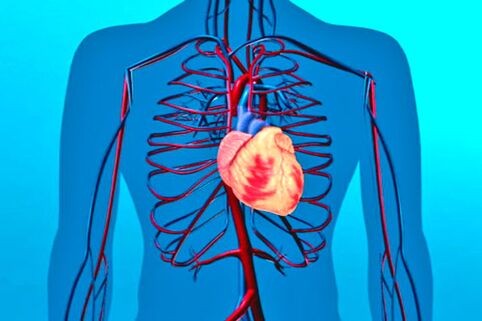
Risk factors for high blood pressure can vary depending on the type of disease. There are two types of hypertension: primary or essential hypertension and secondary hypertension. The first type occurs many times more often than the second - it is diagnosed in 95% of patients with high blood pressure, and its development is related to three groups of factors: the general condition of the body, lifestyle and heredity. Secondary hypertension affects 5% of patients, and the risk factor for its development is various pathologies of individual organs. Some factors can be controlled, reducing the risk of developing the disease.
Risk factors for primary hypertension
Essential arterial hypertension is a multifactorial disease; In some cases, it is impossible to accurately determine the cause of the increase in pressure. The danger of the disease lies in the fact that its symptoms do not appear immediately - the causes can undermine health gradually and unnoticed. Moreover, high blood pressure, even in a latent state, increases the risk of heart attack and stroke.
Health
One of the causes of high blood pressure is the deterioration of the elasticity of arterioles - the small arterial vessels that carry blood to the capillaries. The condition of the vessel walls is influenced by many factors:
- aging of the body;
- sedentary lifestyle;
- heredity;
- inflammatory processes in tissues.
The composition of the blood is also important for the health of the vascular system. Weakening of the circulatory system is primarily associated with diabetes mellitus. Blood sugar levels are regulated by insulin, a hormone from the pancreas. If its secretion is reduced or it cannot perform its functions normally, the blood vessels are stimulated by the sympathetic nervous system more than they are dilated by insulin, leading to an increase in blood pressure.
In addition to the condition of the blood vessels, the risk of high blood pressure is also influenced by body weight. Due to obesity, the body needs more blood, which increases the load on the heart and blood vessels. According to statistics, 85% of people with this disease have a body mass index higher than normal. If obesity is combined with diabetes, it indicates a more complex metabolic syndrome - a metabolic pathology in which the destruction of the vessel walls by cholesterol, triglycerides and glucose can lead to the development of atherosclerosis.
A risk factor for developing high blood pressure is also sleep apnea - the cessation of breathing for 10 seconds or longer during sleep. This happens in case of severe snoring, when the airways are completely blocked due to the pathology of their structure or other reasons. Each stop of breathing means a strong strain on the body, and the pressure rises to 200-250 mm Hg. Art. Regular attacks lead to chronic arterial hypertension.
Lifestyle
A poor lifestyle is a group of risk factors that can be most easily controlled in order to prevent the development of diseases. These include:
- unhealthy diet, which leads to an upset of the body's salt balance;
- lack of physical activity;
- smoking;
- alcohol abuse;
- chronic stress.
Excessive consumption of table salt is a symptom that unites most people with arterial hypertension; Risk factors for this include increased sodium concentration and low potassium. Salts affect pressure on both sides: they cause blood vessels to constrict and retain water in the body. As a result, both the volume of blood and the pressure on the walls of the arteries increase. To avoid this, you should consume no more than 5. 8 g of salt per day.
A sedentary lifestyle does not only lead to obesity. With a lack of activity, arrhythmia develops - the heart weakens, and in order to pump the necessary amount of blood, it has to beat more often, which increases the load on the entire cardiovascular system. During exercise, hormones are produced that strengthen the heart muscle and relax blood vessels, leading to a decrease in blood pressure.
Smoking increases blood pressure, whether it is smoked, chewed or snorted. The chemicals with which it is impregnated destroy the blood vessels. Nicotine has a complex effect on the circulatory system - it speeds up the heartbeat, increases the load on the blood vessels, and narrows the lumen of the arteries. Electronic cigarettes are not immune from this negative effect either, although if the carbon monoxide produced during the burning of tobacco does not enter the blood, the blood vessels will still be healthier.
Alcohol damages the heart muscle, leading to increased blood pressure. A maximum of 0. 5 liters of 5% alcohol per day is recommended for women, a maximum of 1 liter for men before the age of 65, and a maximum of 0. 5 liters after the age of 65.
Stress causes disturbances in the functioning of the nervous system and leads to a complex deterioration of the body's functioning, including blood pressure. In addition, this is the background for the development of bad habits - overeating, smoking and alcoholism - which directly increase the risk of developing arterial hypertension.
Heredity

When diagnosing hypertension, family history is particularly important, risk factors are usually the general environment (the ecological situation of the family's place of residence) and behavior (lifestyle factors are most likely inherited from parents to children), but primarily genes. Heredity is considered the main factor in the development of arterial hypertension: there are genes that cause an increase in the synthesis of renin, the kidney hormone that raises blood pressure.
Hypertension is inherited in 30% of cases, so it is important to monitor the family history and record all diseases diagnosed in close relatives (parents, siblings, grandparents) - this helps to assess the risk of developing the pathology and prevent it. If there is danger, you need to manage your lifestyle even more carefully.
Knowing all these factors, high blood pressure can be prevented by monitoring the development of prehypertension, a condition in which blood pressure represents the borderline between normal and dangerous.
| Condition | Pressure values (mmHg) | |
|---|---|---|
| Systole | Diastole | |
| Norm | 120 | 80 |
| Prehypertension | 120–139 | 80–89 |
| Hypertension | >140 | >90 |
In order to recognize the disease in time, if you are at risk, or to monitor your health in the case of high blood pressure, it is recommended to measure your blood pressure twice a day: in the morning and in the evening, and when you feel unwell.
Risk factors for secondary hypertension
If primary hypertension develops against the background of a general deterioration of the condition of the body, and especially of the circulatory system, then the risk factors for the development of secondary hypertension are specific diseases of the kidneys, endocrine glands, and the cardiovascular system.
Kidney diseases
The main renal pathology leading to increased blood pressure is a decrease in the lumen of the renal artery. It can be congenital or develop at an older age. The main reasons for the intravital development of pathology:
- thickening of the smooth muscles of the artery - occurs in young women;
- arteriosclerosis - in old age.
Due to this disease, blood flow to the kidney deteriorates, resulting in increased secretion of renin and angiotensin. Together with the adrenal hormone aldosterone, they lead to an increase in vascular tone and an increase in blood pressure. To treat the pathology, the vessel is mechanically expanded and strengthened with a frame.
In addition, changes in hormone levels can be affected by chronic pathological processes occurring in the kidneys - pyelonephritis, formation of stones in the bladder, etc. The opposite reaction can also occur - high blood pressure leads to diseases of the urinary system.
Adrenal tumors
Occasionally, diseases of the adrenal glands lead to an increase in arterial tone. These include the formation of tumors that increase hormone production:
- Aldosterome - produces aldosterone. In addition to high blood pressure, this also leads to an increased excretion of potassium from the body.
- Pheochromocytoma - produces adrenaline, which makes the heart beat faster, leading to increased blood pressure. Other symptoms are hot flashes, skin redness and increased sweating.
In both cases, the treatment consists of removing the adrenal glands.
Thyroid dysfunction
In the case of secondary hypertension, certain diseases of the thyroid gland can be risk factors: diffuse goiter, nodular goiter. They lead to thyrotoxicosis - an increase in the production of thyroid hormones. These biologically active substances regulate metabolism in the body; if they are too much, the heartbeat increases, which leads to an increase in blood pressure.
Taking medicines
In addition to diseases, secondary hypertension can also be caused by taking various medications and other substances. These include:
- antidepressants;
- drops and sprays for the treatment of colds;
- anti-inflammatory drugs;
- oral contraceptives;
- corticosteroids;
- drugs - cocaine, amphetamines;
- hematopoietic stimulant;
- anti-asthma medications;
- Medicines for high blood pressure - if stopped, can cause a sharp rise in blood pressure.
If high blood pressure is caused by drugs, consult a doctor and replace the drugs you are taking with analogues with fewer side effects.
Other risks of developing the disease
There are othersrisk factors for high blood pressure. Unlike diseases and lifestyle choices, they cannot be eliminated or controlled.
One such factor is race. Research shows that high blood pressure is more common and develops earlier in blacks than in whites, Hispanics, Asians, and others.
A person's gender also affects - men have a higher risk of high blood pressure, especially in adulthood and old age. Women are at risk during menopause and pregnancy. The risk increases with age in both sexes. If the probability of developing the disease does not exceed 10% until the age of 29, it reaches 50% at the age of 60-69.
Most of the world's population is exposed to risk factors for high blood pressure at some point in their lives. In the United States, according to research, 9 out of 10 people will get it sooner or later, and in most cases it is related to an unhealthy lifestyle. Quitting bad habits, seeing your doctor regularly, and checking your blood pressure are the best ways to stay safe.






















